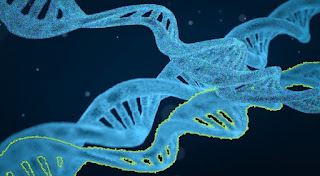Mutations Further Wreck Evolutionary Speculations
Charles Robert Darwin took the ancient pagan concept of evolution that had been kicked around for hundreds of years, gussied it up, and speculated about universal common ancestry through natural selection. Traditional Darwinism began to fade, but the modern synthesis saved it from the scrap heap of history.
Incorporating the science of genetics initiated by Gregor Mendel (peas be upon him), mutations became vitally important. Time, mutations, and natural selection are a trifecta. While Darwin's cheerleaders claim that genetics and mutations support evolution, that is the opposite of the truth.
 |
| DNA and Mutations, modified from Pixabay / Arek Socha |
Most mutations are harmful, evolutionists will admit, but once in awhile a beneficial mutation comes along that can lift a molecule on its way to personhood. Between the good and bad mutations is a vast field of “silent” or neutral mutations – ones that don’t change the protein, but lie in wait for their opportunity to contribute variations to the evolutionary Tinker Toy shop. Enough silent mutations, they think, might actually come together in serendipitous combinations to produce something novel. Such innovations are the feed stock of evolutionary progress. Everything from sponges to trilobites to dinosaurs and eagles came about this way—including us. So the story goes.. . .
My, what implications could it have for evolutionary biology? It’s not hard to figure that one out. Synonymous or silent mutations “have been generally thought to be benign,” says one author of the study in Nature, George Zhang. “We now show that this belief is false.” Zhang is not mincing words. Silent mutations are not benign. That belief is false.
To be come better informed, read all of "Mutations Are Not Neutral" and consider its more in-depth companion piece, "Mutations Are Not the Main Source of Genetic Variety for Evolution." Be sure to come back, there is another article to consider.
 |
| Mutated from an illustration by Sidney Paget, 1895 |
Darwin's Flying Monkeys™, those anti-creationist keyboard warriors on the internet, often refer to Richard Lenski's E. coli bacteria research as proof of evolution. Well, he conclusively proved that those bacteria evolved into those bacteria. Minako Izutsu and Richard Lenski conducted research on mutations, but it was contradicted by other research and they ignored documented facts. They also neglected to discuss how bacteria have frontloaded mechanisms for adaptation. These jaspers utterly failed to demonstrate that mutations produce genetic variety.
The most common explanation for the arrival of the fittest is mutations, the accidental changes in the genomic code caused by radiation, mutagens (such as cancer-causing chemicals), or simply DNA copying mistakes.
. . .
The idea of mutations as a source of genetic variety has its detractors. In June 2022, New Scientist reporter Michael LePage attempted to determine current thinking about mutations and whether they can be considered the central source for the “arrival of the fittest.” His headline asserted that “debate about the source of evolution’s diversity may have been settled” by the long-term evolutionary experiment (LTEE) conducted since 1988 at Michigan State University under the direction of Richard Lenski. LePage says that the LTEE attempted to solve the “long-standing debate in biology about the relative importance of existing variation versus new mutations in evolution.”
For the article in its entirety, see "Do Mutations Provide New Genetic Information?"